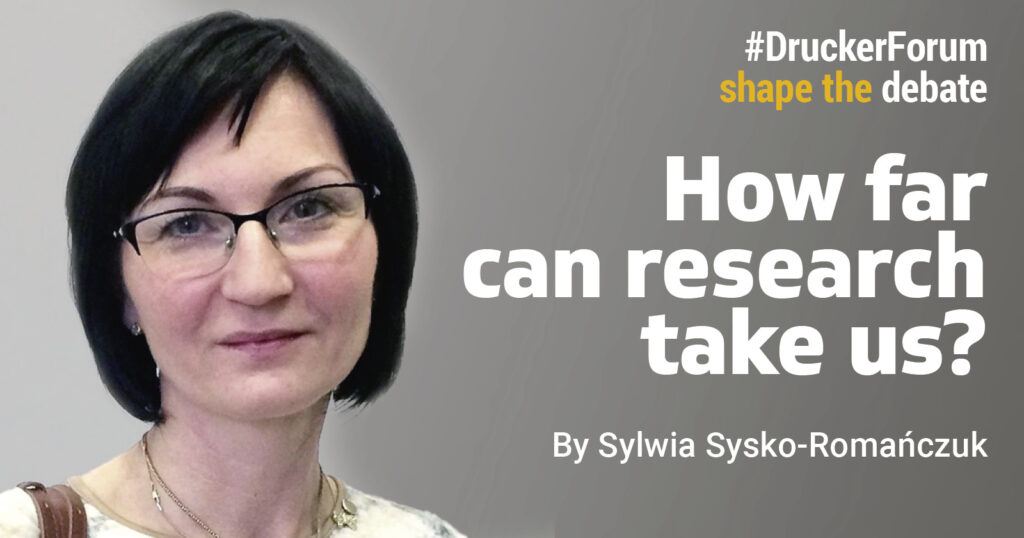
Starting a panel discussion at Global Peter Drucker Forum 2021, Helga Novotny elaborated on the vast horizon of challenges faced by the global science in the 21st century. The academic community has been observing a rise in complexity: from tech finance speeding the banking systems to the climate changes speeding the economic systems. Complex systems reveal three inherent properties:
- Emerging interconnections of the networks in which unexpected can come up
- Building feedback loops into interconnections with positive or negative reinforcement
- Massive adoption of ICT solutions
These three tipping points are starting radical changes in the systems’ nature, showing that the transformational breakdown has just arrived. Complex systems are filled with wicked problems, social or cultural, difficult, or impossible to solve. Their complex and interconnected nature, which makes it difficult to determine appropriate solutions.
Doxa, techne, episteme, and predictive algorithms
Some are convinced that building models are essential for making better decisions. The scientific method has been adulterated with doxa mixed with philosophical beliefs, populism and conspiracy theories for centuries. But the scientific method has turned out to be the only reliable way of understanding the world because it invites professionalism, transparency, accountability, and methodological rigor. Thanks to episteme, progress is observed. The scientific method has branched out to emerging new technologies that have been changing our lives. Quantum computing is also a promising techne driver. New technologies allow us to build models with „what-if” calculations that are so much better in prediction than the previous ones—science and technology, in a fantastic way, accelerate progress. But we need to ask “To make better decisions by what criteria? It is an open question which provokes new ones: Do we need wide ranging data driven methods as means to determine markets, given the need for personalization, or should we be thinking more on a village/community/individual level? Modeling partial predictive solutions builds our belief in “managing the present”, but do we know where we are going? Without an answer to this question, it is difficult to manage performance.
Solving wicked problems with technology and interdisciplinary cooperation
Some scientists say that excellent theory comes from engagement with the world problems, not gaps in the literature. But could we expect much more from science? As the world is filled with wicked problems, they can only be solved with interdisciplinary research. That is not the strongest point of universities. Rebuilding how research is funded, and collaboration, means that performance in science cannot be limited to scientific publications The three together of teaching, researching, and commercializing will drive academia performance.
Co-creating collaboration between researchers, entrepreneurs, and investors
It is important that scientists should work with entrepreneurs to invest investors’ money efficiently. Investors expect scientists to understand the research gap and entrepreneurs to understand the creative business problem resulting from research. Scientific models take time to mature for commercialization. Entrepreneurs come to investors for funds with simpler models that could create immediate revenue for building ventures. However, should science performance depend on commercialization success (results) or rather on learnings achieved in that process?
Regaining the trust and support of society at large
Until recently, drugs needed decades from discovery to development.,. Today we see both happening at the same time. Research does not seem to be the limiting factor. We have been observing very intense multidisciplinary collaboration that has not happened before. There are two challenges: (1) to have more people appreciating and embracing the importance of that cooperation, and (2) allowing research to be detached from urgent citizens’ purposes. Science is moving at a breathtaking speed. It is therefore essential to act against scientific illiteracy and anti-scientific campaign by boosting ethical values with philosophical purposes. Paradoxically, science helps us solve the wicked problems we face; at the same time, scientists are losing the support of society.
Transformational time for research that does not belong only to universities
Understanding research timeline as long-terms solution to wicked problems will result in breakthrough innovations in both science and society. Technology, knowledge, and research are developed not only in universities but also in companies The best AI-powered projects are now being done at Google and Microsoft, not universities. However, quantum research has moved from companies to universities.
Chester I. Barnard (1886-1961), one of the pioneers of management thinking, wrote in The Functions of the Executive (Boston: Harvard University Press, 1938), that businesses are complex systems of cooperation because of the people of which they are composed. He was probably the first authors to emphasize the role of leadership, although the centrality of his work was cooperation. He wrote: “Cooperation, not leadership, is the creative process; but –he added– leadership is the essential fulminator of its forces.”
A cooperative endeavor between academia, business, and end users, seems to be a possible route to a quicker resolution to the wicked problems that bedevil the world.
About the Author:
Sylwia Sysko-Romańczuk is professor of innovation and entrepreneurship at Warsaw University of Technology with research interests in value-driven growth in the digital and networked economy.

